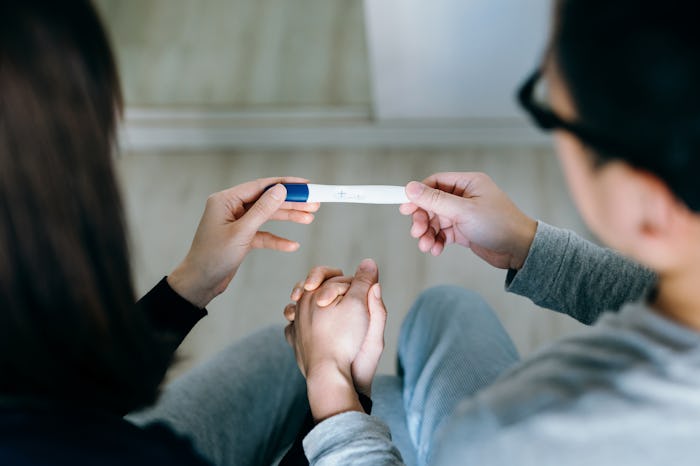News

Covid-19 May Temporarily Lower Sperm Count & Motility, A New Study Shows
“Couples with a desire for pregnancy should be warned that sperm quality after Covid-19 infection can be suboptimal.”
Couples looking to conceive may have even more reason to avoid contracting Covid-19, according to a new study. In examining semen samples from men who’d recently recovered from the virus, researchers in Belgium found contracting Covid-19 can reduce both sperm count and motility for months after, effectively lowering the chance a sperm will fertilize a partner’s egg.
“Semen is not infectious with SARS-CoV-2 at 1 week or more after Covid-19 infection,” researchers noted. “However, couples with a desire for pregnancy should be warned that sperm quality after Covid-19 infection can be suboptimal.”
Researchers in Belgium set out to study the contagiousness of sperm during recovery from symptomatic illness due to Covid-19 infection as well as Covid-19’s impact on fertility. In examining samples collected from 120 men who had recovered from confirmed cases of Covid-19, they found that although the novel coronavirus was not detected in semen following infection, sperm quality was reduced.
Researchers found that sperms’ ability to “swim” effectively through the female reproductive tract in order to reach the egg was reduced in 60% in men tested less than a month after recovering from Covid-19. That number dropped to 37% of men when tested between one to two months after infection and to 28% of men more than two months after infection.
Mean sperm count was reduced in 37% of men tested less than a month after they’d contracted and recovered from Covid-19. When tested one to two months after infection, sperm count was reduced in 29% of men while just 6% of men showed reduced sperm count more than two months after recovering from the virus. In contrast, separate research has shown no significant decrease in any sperm parameter, including count, following vaccination with an mRNA Covid-19 vaccine.
But Covid-19 doesn’t appear to impact sperm quality in the long term. According to researchers, participants’ sperm motility and sperm count were reduced only for a few months immediately following a Covid-19 infection. “The estimated recovery time is 3 months, but further follow-up studies are underway to confirm this and to determine if permanent damage occurred in a minority of men,” researchers concluded.
Researchers still aren’t clear on why Covid-19 impairs sperm quality. Previously researchers have thought the temporary sperm abnormalities seen during and after Covid-19 infection were caused by fever as a significant elevation of body temperature for a prolonged period has been known to have this effect. But researchers in Belgium found no correlation between sperm quality and the participants who displayed severe fevers when ill as not all participants reported having had fevers.
“In our study, the presence and severity of fever and symptom score during Covid-19 disease were not correlated with sperm quality parameters, indicating that other mechanisms than fever linked to Covid-19 infection could be involved in the pathogenesis of sperm damage,” researchers concluded.
The results of this study, which was published Monday in Fertility and Sterility, mirror the results of a smaller study conducted in 2020. That study, which saw researchers analyze 18 semen samples collected from 18 different men eight to 54 days after they’d recovered from Covid-19, also found an impairment of sperm quality following a moderate case of illness.
Studies referenced:
Donders, G. G. G., Bosmans, E., Reumers, J., Donders, F., Jonckheere, J., Salembier, G., Stern, N., Jacquemyn, Y., Ombelet, W., & Depuydt, C. E. (2021). Sperm quality and absence of SARS-CoV-2 RNA in semen after COVID-19 infection: a prospective, observational study and validation of the SpermCOVID test. Fertility and Sterility. https://doi.org/https://doi.org/10.1016/j.fertnstert.2021.10.022 Gilbert
Holtmann, N., Edimiris, P., Andree, M., Doehmen, C., Baston-Buest, D., Adams, O., Kruessel, J.-S., & Petra Bielfeld, A. (2020). Assessment of SARS-CoV-2 in human semen—a cohort study. Fertility and Sterility, 114(2), 233–238. https://doi.org/https://doi.org/10https://doi.org/10.1016/j.fertnstert.2020.05.028.1016/j.fertnstert.2021.10.022 Gilbert